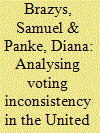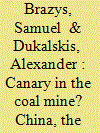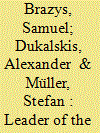|
|
|
Sort Order |
|
|
|
Items / Page
|
|
|
|
|
|
|
| Srl | Item |
| 1 |
ID:
155069


|
|
|
|
|
| Summary/Abstract |
In many international institutions, contested norms pass via voting. Although votes express national positions, dynamic vote shifts are a widespread phenomenon. Why do states sometimes change their voting stances concerning re-occurring international rules and norms? To explain observed variation, this analysis theorises the role of domestic and external windows of opportunity as well as the role of lobbying in the United Nations General Assembly. It shows that changes in government composition and changes in the text of re-occurring international rules and norms matter. Yet, whilst resourceful actors more likely change their voting stance after having successfully negotiated text changes, less powerful states are more likely to shift voting stances in response to third party lobbying.
|
|
|
|
|
|
|
|
|
|
|
|
|
|
|
|
| 2 |
ID:
155159


|
|
|
|
|
| Summary/Abstract |
How China assumes its position of superpower is one of the most important questions regarding global order in the twenty-first century. While considerable and sustained attention has been paid to China’s growing economic and military might, work examining how China is attempting, if at all, to influence the ecosystem of global norms is in its earlier stages. In this article we examine China’s actions in an important venue for the development of global norms, the United Nations General Assembly (UNGA). Using a unique dataset that captures how other countries move into or out of alignment with China on UNGA resolutions that are repeated over time, we find statistical evidence that China used diplomatic and economic means in an attempt to subtly alter international norms. We further illustrate these findings by examining four states that made substantive moves toward China on resolutions concerning national sovereignty, democracy, international order, non-interference, and human rights.
|
|
|
|
|
|
|
|
|
|
|
|
|
|
|
|
| 3 |
ID:
192188


|
|
|
|
|
| Summary/Abstract |
This research report measures changes in China's public diplomacy after a May 2021 collective study session of the Chinese Communist Party Politburo. The session examined the country's global communications strategy and fuelled speculation about what might change in China's external communications, particularly with regard to its “wolf warrior” diplomats. Combining hand-coding and quantitative text analysis, we develop and validate a measure of “wolf warrior diplomacy” rhetoric and apply it to over 200,000 tweets from nearly 200 institutional, media and diplomatic Twitter accounts. Using a difference-in-difference research design, we evaluate if the session led to a noticeable change in the tweets of diplomats based in OECD countries. After the announcement, PRC diplomats in the OECD moderated their tweets in comparison to non-OECD diplomats, but we do not detect a major re-orientation of PRC communication strategies. These findings have relevance for scholars of Chinese foreign policy, nationalism and public diplomacy.
|
|
|
|
|
|
|
|
|
|
|
|
|
|
|
|
| 4 |
ID:
137148


|
|
|
|
|
| Summary/Abstract |
Since its institutional birth in 1947, the General Agreement on Tariffs and Trade (GATT) / World Trade Organization (WTO) has mushroomed from 23 original contracting parties to 157 members as of September 2012. Another 28 countries are currently observers, each at varying stages of the accession process. WTO members and observers cover some 99 per cent of the world's population and over 99 per cent of global trade. However, there are still 13 states outside the multilateral rules-based trading system. This paper argues that existing explanations of membership and accession do not fully explain why these states remain outside the WTO, with implications for membership in international institutions generally. The paper tests hypotheses of non-membership based on a lack of willingness (domestic support), ability (technical capacity) or external pressure, and augments these statistical findings with a comparative country-level narrative of WTO (non-)accession decision-making in two small island countries.
|
|
|
|
|
|
|
|
|
|
|
|
|
|
|
|
| 5 |
ID:
153933


|
|
|
|
|
| Summary/Abstract |
The 2008 financial crisis hit few places harder than the Euro periphery. Faced with high levels of public debt, Portugal, Italy, Ireland, Greece, and Spain were each compelled to implement harsh austerity reforms. Yet despite this common policy response, the recoveries have shown significant divergence. In particular, Ireland seems to have managed to succeed economically in a way that the other peripheral countries have not. The prevailing narrative is that Ireland’s recovery from the crisis is due to “austerity” and improved “cost competitiveness.” Drawing upon theories from the study of comparative capitalism we challenge this narrative, and argue that the Irish recovery is an outcome of a state-led enterprise policy aimed at nurturing a close relationship with corporate firms from Silicon Valley. Using qualitative and quantitative investigation we find evidence that this state-led FDI growth model, rather than austerity induced competitiveness, kick-started Ireland’s recovery from crisis. As Ireland is a critical case for the “success” story of austerity in Europe, our findings represent a significant challenge to the politics of adjustment. It suggests the strategies of business-state elites, and not simply the workings of electoral coalitions, explains the politics of adjustment in advanced capitalism.
|
|
|
|
|
|
|
|
|
|
|
|
|
|
|
|
|
|
|
|
|